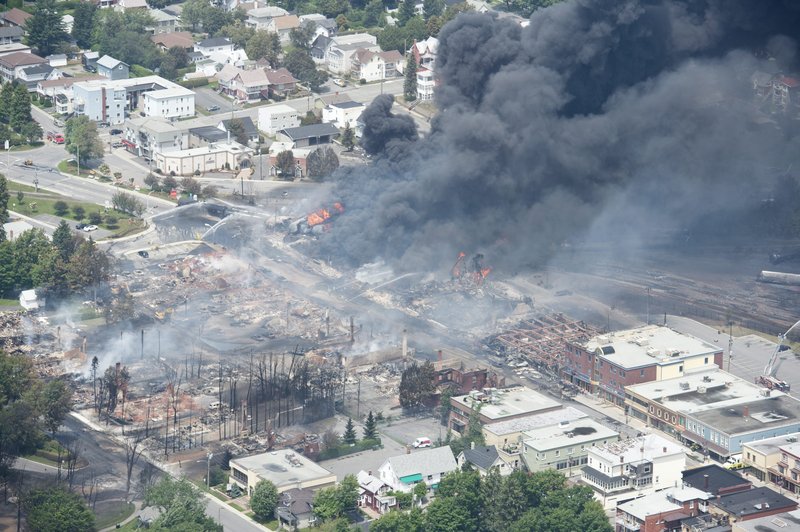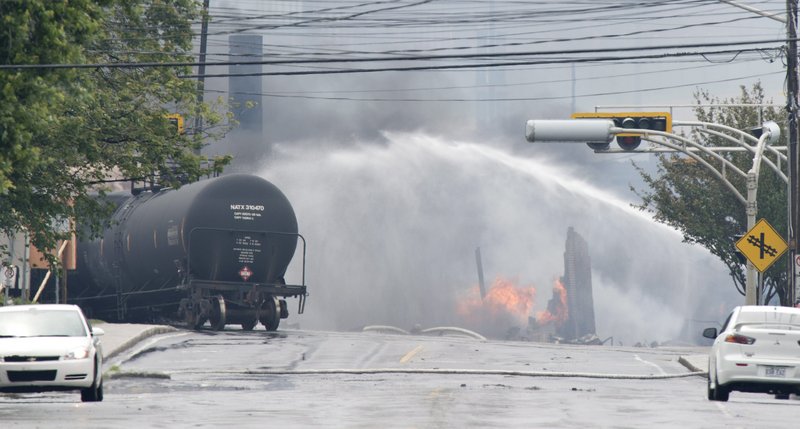WASHINGTON – The debate over transportation of oil intensified in Maine and nationally Monday as Canadian officials investigated Saturday’s deadly train derailment and explosion in Quebec.
After months of controversy over the proposed Keystone XL pipeline, the early-morning crash in Lac-Megantic drew national attention to the growing trend of sending crude oil by rail from North Dakota and Canada to refineries on the Eastern Seaboard.
Whether the disaster will influence debate over the Keystone XL project – which is still under review by the State Department – was unclear Monday.
A rejection of the northern portion of the pipeline by the Obama administration would likely increase the amount of oil that’s transported by rail. It could also heighten interest in using the Montreal-to-Portland pipeline to carry crude from Alberta to the East Coast.
Critics of both modes of transportation cited the deadly explosion as proof of the need to revisit the nation’s energy policy and reduce its reliance on oil.
“This horrific accident makes it clear that transportation of oil – whether it is ‘fracked’ oil from the Bakken fields in North Dakota or tar sands oil from Alberta – is an extremely risky and dangerous practice,” said Glen Brand, director of the Maine Sierra Club.
The amount of crude oil transported by rail has risen exponentially in recent years as oil companies use new technologies to tap into sources in North Dakota, Montana and Alberta.
Opponents have stymied approval of TransCanada’s Keystone pipeline, which would traverse the Midwest en route from Alberta to the Gulf Coast.
At the same time, existing pipelines to Midwest and Gulf Coast refineries cannot accommodate the growing supply. As a result, tens of thousands of rail cars filled with crude oil have passed through Maine in the past year and a half en route to refineries in New Brunswick.
The 73-car Montreal, Maine & Atlantic train that derailed in Lac-Megantic, sparking an explosion that killed at least 13 people, was bound for Irving’s refinery in Saint John, New Brunswick.
A spokeswoman for the American Petroleum Institute said the industry trade group does not support one method of transporting oil over another. As domestic oil production grows, the country will need a variety of ways to move crude safely, Sabrina Fang said.
“We are for all methods of transporting oil,” she said.
About a dozen protesters from the group 350 Maine gathered outside Montreal, Maine & Atlantic’s offices in Hermon on Monday to call for more stringent inspection of Maine railways and a decrease in the amount of oil transported through the state.
Group members held signs that opposed “fracking” — the hydraulic fracturing process used to extract crude from North Dakota oil fields — and the transportation of that oil through Maine.
“We feel this tragedy was avoidable and I want an independent investigation into these rail lines that carry these trains,” said Jim Freeman, a 350 Maine member who was arrested in Fairfield on June 27 after planning to block a Pan Am Railways train carrying oil. “Just walk a couple hundred yards up a track and you’ll be shocked at the condition the railways are in.”
Read Brugger, another 350 Maine member who was arrested in Fairfield, called for state and federal agencies to do more to inspect rail lines and take other steps to ensure that oil is being transported through Maine safely.
While there’s still a need to transport oil, Brugger said, methods have to be developed to make the process safer and better for the environment.
“It’s not something we see happening overnight,” Brugger said. “We need to find alternatives.”
Fadel Gheit, an energy analyst with Oppenheimer & Co. Inc., told The Associated Press that interpreting the Quebec disaster as a boost for the Keystone project would be like “jumping from the frying pan into the fire.”
Gheit, who supports the Keystone project, said Canadian Prime Minister Stephen Harper and other pipeline proponents will have to persuade the Obama administration of the project’s merits, rather than the dangers of rail.
“If I have a choice of importing oil from Canada, Venezuela or Saudi Arabia, where would I feel much better with?” he asked, calling the answer obvious.
Speculation persists that pipelines could one day carry crude oil from Alberta to Maine.
Officials at Portland Pipe Line Corp. have said they have no plans to reverse the flow of their pipeline between Portland and Montreal to carry Canadian crude to Maine. But they acknowledge they have explored the possibility, prompting protests from Maine groups that oppose “tar sands” oil.
A spokesman for Portland Pipe Line could not be reached for comment Monday.
Kevin Miller can be contacted at 317-6256 or at:
kmiller@mainetoday.com
On Twitter: @KevinMillerDC
Send questions/comments to the editors.





Comments are no longer available on this story